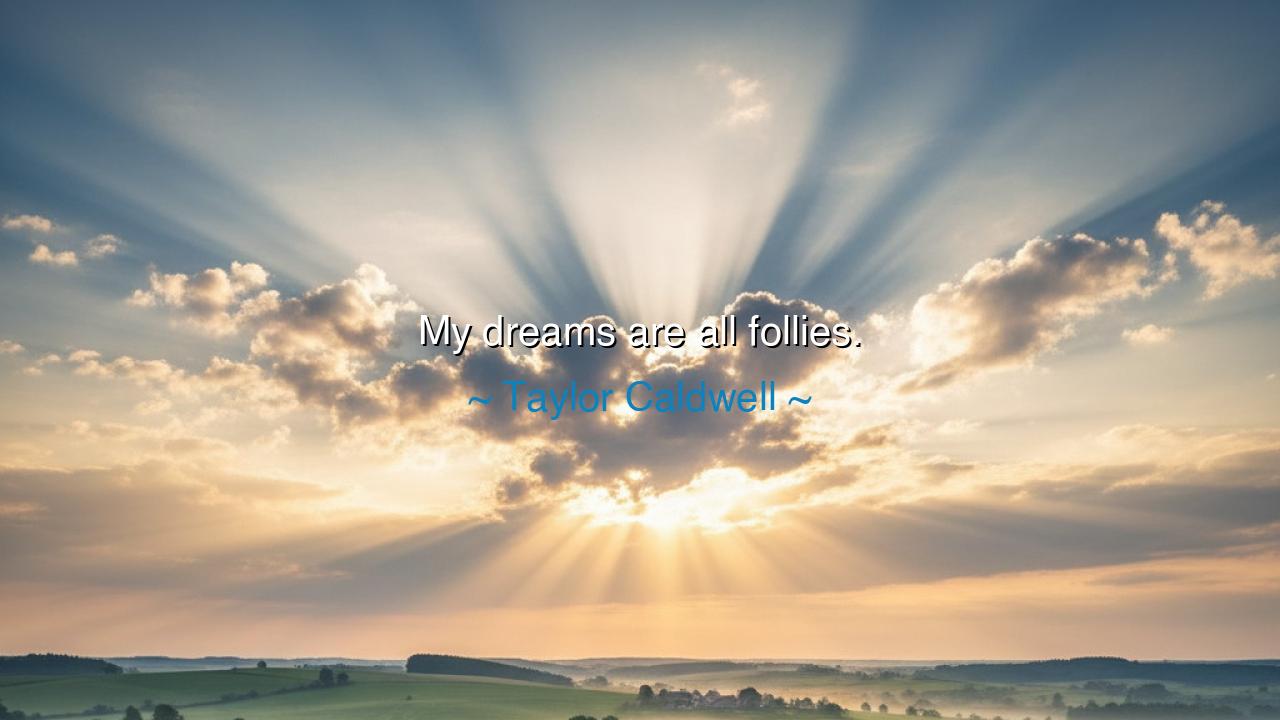
My dreams are all follies.






The words of Taylor Caldwell, “My dreams are all follies,” are at once sorrowful and luminous—an admission born not of despair, but of wisdom earned through the long road of disillusionment. In them, we hear the sigh of a soul that has dreamt greatly and suffered for it, yet still gazes tenderly upon its own follies. To call one’s dreams foolish is not always to renounce them; sometimes it is to recognize that dreams, like fire, can both warm and burn. Caldwell, the great storyteller of ambition and destiny, spoke as one who had witnessed how human longing so often outpaces human strength—and yet, how that longing gives life its beauty.
In the old tongue of the ancients, folly did not mean mere foolishness—it meant daring beyond reason, reaching beyond the mortal measure. The builders of Babel were called fools, and yet, in their folly, they touched the heavens. So too do Caldwell’s words speak not only of disappointment, but of the nobility hidden in striving. To dream is to defy the confines of the world; to fail is to prove that one has lived. Her lament, “My dreams are all follies,” is the whisper of one who has learned that the universe humbles even the most fervent heart, yet she speaks with the tenderness of one who would not have lived otherwise.
Consider the life of Leonardo da Vinci, whose notebooks overflowed with visions centuries ahead of his time—machines that would one day fly, weapons that would roar with thunder, and anatomies that only future science could confirm. Many of his dreams were never realized; he died with sketches, not sculptures, with blueprints, not battles won. By the cold measure of accomplishment, one might say his dreams were follies. Yet those very “follies” became the seeds of mankind’s progress. His failure was not weakness—it was prophecy. Thus, every dreamer who dares to reach beyond their age must accept the laughter of others, and sometimes their own, when they look back upon what seemed so certain.
Caldwell, who wove tales of empire and ambition, understood the burden of those who dream too fiercely. She knew that dreams often bloom in a world that cannot yet sustain them—that vision and reality seldom walk in step. When she called her dreams follies, she was not mocking herself, but acknowledging that dreams, though divine in origin, must pass through the imperfect vessel of human effort. The world breaks many dreams not because they are unworthy, but because they are too radiant for their time. And yet, even in their breaking, they cast light upon the path of those who come after.
There is also a deep humility in Caldwell’s confession—a humility that all wise souls come to know. The ancients taught that wisdom begins with the acceptance of limitation. The philosopher who knows that he cannot control fate, the artist who accepts that her work will never be perfect, the lover who understands that passion is fleeting—all share in this same insight. To see one’s dreams as follies is not to despise them, but to love them with clear eyes. For the dreamer who can laugh gently at their own illusions has attained a form of freedom that no success can give.
Yet, let us not mistake humility for defeat. The message hidden within Caldwell’s words is not to abandon dreams, but to hold them lightly—to dream bravely, yet with compassion for the self. The fool who dreams is often wiser than the cynic who never tries. A life without dreams is a life without ascent, without color, without music. Better to fall reaching toward the sun than to sit forever in the shade of fear. Thus, when Caldwell names her dreams follies, she does so as an elder might speak of youthful loves—foolish, yes, but sacred all the same.
The lesson, then, is clear for all who listen: honor your dreams, but do not worship them. Let them inspire you, but not imprison you. When they fail, bow gracefully, and learn. When they succeed, remember that all triumphs are temporary, and all follies divine. For in the end, it is not the achievement of dreams that defines the soul, but the courage to have dreamt at all.
So live as the ancients counseled: walk boldly in your folly. Let your dreams be wild, your heart be unguarded, and your wisdom be gentle. For every dreamer who has been called a fool has, in truth, carried the torch of progress, of beauty, and of hope. And when the day comes that you look back upon your life and whisper, “My dreams were follies,” may you also smile—for in those follies, you will find the essence of your humanity and the proof that you truly lived.






AAdministratorAdministrator
Welcome, honored guests. Please leave a comment, we will respond soon